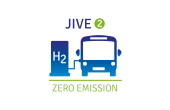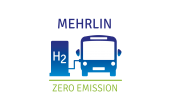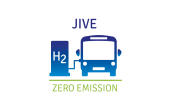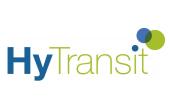Brussels, 30th November 2018
Today (30th November 2018) marks the official launch of the Sanremo site of the High V.LO-City project by the Mayor of Sanremo, Alberto Biancheri. Three fuel cell electric buses and their hydrogen refuelling infrastructure have been deployed in the city.
The deployment and testing of the buses is part of the High V.LO-City project, which aims at facilitating the deployment of fuel cell electric buses and their related hydrogen refuelling infrastructure in European cities. The project is co-funded by the Fuel Cells and Hydrogen Joint Undertaking. Bart Biebuyck, Executive Director at the FCH-JU, said: ‘Supporting the development of fuel cell buses, from making a business case to proving commercial viability, is an ongoing journey for the FCH JU. High V.LO-City is important as it successfully trials small bus fleets in various cities in the UK, the Netherlands, Belgium and today in Italy. The project is proving that fuel cell buses can operate with the same flexibility as diesel buses preserving the productivity of public transport without noise, emissions or particle pollution. Altogether, hydrogen buses represent a strategic choice for cities such as Sanremo, which are striving to improve the quality of life for their citizens.’
The three Van Hool buses are operated by the local bus operator Riviera Transporti and are replacing conventional diesel fuel buses, in an effort to cut emissions from public transport in the city. The three buses will enter in full operation at the beginning of December. Bus drivers have been trained to operate the buses as well as to refuel them. They have also been trained by Ballard, the fuel cell provider.
The buses will be operated on the Sanremo – Taggia suburban line, which is about 14km long. Sandro Corrado, Director at Riviera Transporti, said: ‘The line was served by trolley buses until the first years of this century. Several roundabouts where then built along the road and the trolley line was abandoned, replaced by diesel buses. I am sure the passengers and inhabitants of Arma and Taggia will welcome the return of silent, electric buses with the fuel cell buses’.
The buses are refuelled at the hydrogen refuelling station funded by the project, located in the east suburbs of Sanremo. The station has been built by Air Liquide and the hydrogen currently used to refuel the buses is delivered by truck trailers. The station has been designed to be upscaled in the future: the long-term objective is to produce 100% green hydrogen on site via electrolysis.
Filip Van Hool, CEO at Van Hool, bus manufacturer and High V.LO-City coordinator, said: ‘Van Hool has been building hydrogen buses for the American market since 2005 and for the European market since 2007. We have gained a lot of expertise through the 11 buses already in operation in the three other sites in the project. Sanremo will directly benefit from the experience accumulated by all partners and we are expecting the operation of the buses to be a success.’
Giovanni Berrino, Transport Councilor of the Liguria Region, said: ‘The Liguria Region closely monitors innovations that can improve the environmental impact of public transport. This project can be called “historical” for our whole territory, and in particular for the Riviera di Ponente. With Riviera Transport and the University of Genoa, we took the opportunity to test these buses through of the High V.LO-City project: it is our duty to improve the quality of life in urban centers and to reduce emissions. I am convinced that a tourist destination like Sanremo, well known and loved in Europe and in the world, can make a significant contribution to the development of solutions which in the near future will be very important to reduce pollution in our cities.’
The demonstration site in Sanremo will pave the way towards the deployment of more fuel cell electric buses in Italy and in other cities and regions in Europe.
***ENDS***
For any inquiry, please contact the project team at secretariat@highvlocity.eu or Valentine Willmann at valentine@hyer.eu / + 32 2 285 4094
www.highvlocity.eu | www.fuelcellbuses.eu | @HighVLOCity
Note to editors
About the High V.LO-City project: cities speeding up the integration of hydrogen buses
The High V.LO-City project, coordinated by the bus manufacturer Van Hool, started in 2012 and will run until the end of 2019. During the course of the project, 14 buses will be operated in 4 locations: Aberdeen, Scotland (4 buses), Antwerp, Belgium (5 buses), San Remo, Italy (3 buses) and Groningen, Netherlands (2 buses). The 14 fuel cell hydrogen buses will be used as like-to-like replacement of conventional diesel buses and trolley buses. The key project objectives are to increase the energy efficiency of the buses and reduce the cost of ownership, as well as to demonstrate an operational availability of the buses close to diesel. Another objective of the project is to contribute to the commercialisation of fuel cell electric buses in Europe.
Since the start of the project, more than 900.000km have already been travelled by the buses and their daily operation is proving that fuel cell electric buses can be put in operation with the same level of efficiency and flexibility as diesel buses. Different methods of hydrogen production are tested and the overall availability of the buses is expected to continue to increase as experience is accumulated by the project partners.
About fuel cell electric buses
Europe is rapidly expanding the demonstration of fuel cell hydrogen buses in regular public transport services in several cities across the continent. Fuel cell electric buses are a type of electric buses. Hydrogen is used to fuel the buses; a fuel cell then transforms the hydrogen into electricity, which is then used to power the bus. Other FCH-JU funded projects demonstrating fuel cell electric buses are CHIC, HyTransit, 3Emotion and JIVE / JIVE 2
About the Fuel Cells and Hydrogen Joint Undertaking
The Fuel Cells and Hydrogen Joint Undertaking (FCH JU) is a public-private partnership between the European Commission (DG Research and Innovation), Europe's FCH industry (Hydrogen Europe) and research organisations (Hydrogen Europe Research), aiming at accelerating the market introduction of fuel cells and hydrogen technologies. It is also a funding agency, supporting R&D and Demonstration projects in transport and energy, such as High V.LO-City. For more information, please visit www.fch.europa.eu.
The High V.LO-City project has received funding from the Fuel Cells and Hydrogen Joint Undertaking under the European Union’s 7th Framework Programme under grant agreement n°278192









